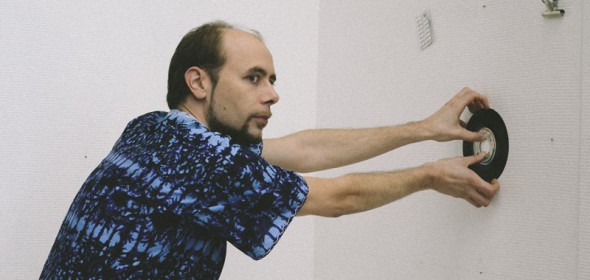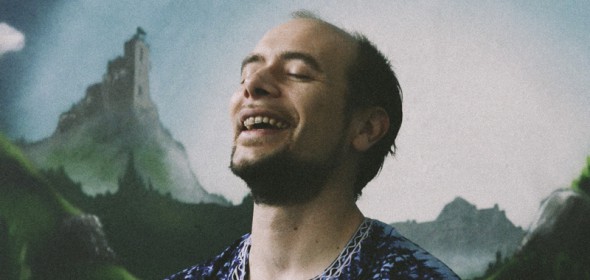Pit Spector is a DJ, producer and a live performer based in Paris. His studio is located in Espace Albatros in Montreuil. This spacious and unusual venue, steeped in a kind of Berlin-style atmosphere, is managed by an association which encourages artistic creativity by offering just the kind of environment these artists need. After playing as a member of the group Antislash and building the reputation of the Zéro Zéro bar, Pit Spector founded his own label Prospector, which is mostly managed as a platform for musician collaborations. His releases quickly made him a major player in the Parisian house scene.

Interview with Pit Spector // courtesy of the artist
Marc Girardot: The Zéro Zéro has contributed a lot to your story. Could you describe this venue and how it had an impact on your musical career?
Pit Spector: Zéro Zéro is a small venue in Paris. Since 2005 we had a lot of parties there, a lot of DJs were coming to play. I used to work there for 4 or 5 years. All my friends I met during high school were working there. It was a kind of family. We were growing up together musically. We released three EPs on Circus Company and each year we were touring a bit. We played at Panorama Bar with Dav Aju for a Circus Company party. It was crazy! It is funny because during this period we were beginning to get gigs, and we discovered Berlin. We wanted to create another place in Paris which was a bit like what we saw in Berlin. Slowly, the Zéro Zéro became that!
It was more of a creative space, a ‘do-it-in-your-own-way zone’. We started a radio station and we were broadcasting all the music that we were playing there. It was a place for people to meet. It was mostly about the atmosphere, the mood in that place: playing the music we wanted, as loud as we wanted! It was like our own Club der Visionäre [laughs].
MG: You are used to visiting Berlin. As an artist, what is your opinion about the city? You have probably noticed that parties in Berlin are quite different than they are here. How would you explain this?
PS: The electronic music culture is really different there. Today, we have a really nice scene in Paris, really good parties are going on, really interesting artists are producing here now but the culture is not as established as it is in Berlin. For 25 years in Berlin, a whole system has been built around the electronic scene. I think that Berlin is slowing down a bit, but still, it is really interesting. You can discover a lot of artists, meet them and exchange with them. I just wish that Paris took more of the German philosophy of organizing parties and enjoying the music.
MG: As you just said, there is a new enthusiasm in Paris about electronic music. Do you think that it is about to get bigger, or are you afraid that it is a trend which will slow down with time?
PS: I think it mostly comes in waves. When I started with electronic music, between 1998 and 2004, it was kind of the French Golden Age in electronic music. After 5 or 7 years, it was slowing down because of legal issues, because the authorities who were pushing other kinds of music. But now, people who are a little bit younger grew up with electronic music and have a good taste in music, and a nice way of organizing parties. It is really nice to have new crews that support the movement. It took time for the organizers to get back to it, we needed a new generation to think differently than we did during the 90s. Many new laws have been passed, so people had to think in a different way make their parties legal.
MG: You seem to manage your label Prospector mainly as a platform for artist collaborations. How did you get to that point?
PS The label has been directly related to the studio since it was established in 2010. At that time, we were mostly working with Antislash, but after a while I wanted to create an artist residency to bring other artists into the studio. Slowly, I started to organize parties called Prospector. With a friend, Mathieu, we launched a concept with artist residency, parties and record releases. We bring artists to the studio for jam sessions and play it in a club. Then, we release these tracks.
We started with my brother Ark, and Losoul. It was a really nice exchange between us because he moved to Lyon five years ago. We never really made music together before, then he got a nice studio there and we worked together for two years. Actually, we will release another EP called ‘Micro Climat’ in June on the Hold Youth label.
After that, I worked with San Proper and we have actually planned to release another record on Prospector this season. I also produced an EP with Ben Vedren, and a second volume of it will be released on March 28th. We played together for the 20th Anniversary of Minibar at Concrete last December, and Cabanne (co-founder of the Minibar label) really liked some tracks of our live set. We decided to edit some parts of it and release it on Minibar. We are really happy about this collaboration. I think we will do some gigs together again this year.
I will start this new season with Narcotic Syntax and it will be released in June. Then, there will be Dandy Jack, The Mole, Dav Aju, Cuthead and Tinman.

Interview with Pit Spector // courtesy of the artist
It is really nice because every month for one week there is a new producer coming to the studio. So we can exchange and play music together. For me it is the best way to work, to collaborate. Over the span of three days, we have time to meet and to find a complementary musical mood between us. Sometimes I just record the session and we jam for hours. It really depends on the artist, but each time it is really a pleasure to discover another artist.
As long as I can stay in this studio in Montreuil, which is really cool and inspiring, I think I’m going to stay in Paris. I have the chance to travel a lot so I think that I am going continue to settle in Paris because, after all, I like this city [laughs].
Additional information
Ben Vedren and Pit Spector: ‘Prospector 3.2’, click here for a preview























